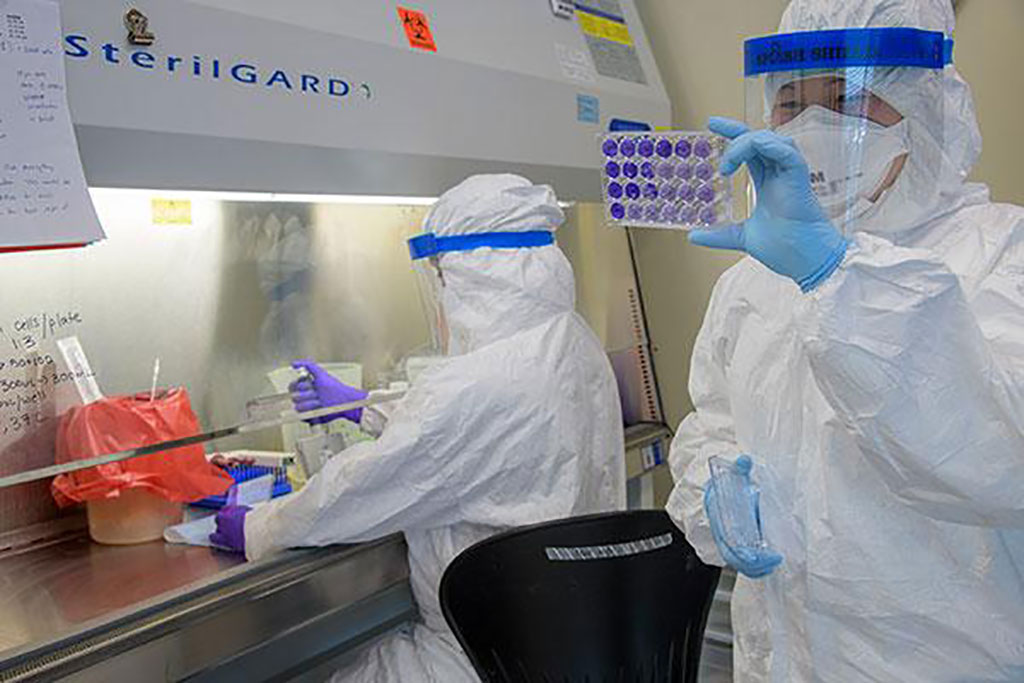Production of High-Quality Antibodies Continues 5-7 Months After SARS-CoV-2 Infection, Finds New Study
|
By HospiMedica International staff writers Posted on 14 Oct 2020 |

Image: Production of High-Quality Antibodies Continues 5-7 Months after SARS-CoV-2 Infection, Finds New Study (Photo courtesy of University of Arizona Health Sciences)
A study of the production of antibodies from a sample of nearly 6,000 people who recovered from COVID-19 has revealed that immunity persists for at least several months after being infected with SARS-CoV-2.
One of the most significant questions about the novel coronavirus is whether people who are infected are immune from reinfection and, if so, for how long. When a virus first infects cells, the immune system deploys short-lived plasma cells that produce antibodies to immediately fight the virus. Those antibodies appear in blood tests within 14 days of infection. The second stage of the immune response is the creation of long-lived plasma cells, which produce high-quality antibodies that provide lasting immunity.
Researchers from the University of Arizona Health Sciences (Tucson, AZ, USA) tracked antibody levels over several months in people who tested positive for SARS-CoV-2 antibodies. The team also developed a blood test to check for SARS-CoV-2 antibodies by employing two different parts of the SARS-CoV-2 virus - S1 and S2. Most tests look for antibodies at S1, which includes the receptor-binding domain wherein the spike protein binds to a protein receptor to infect cells. The UArizona Health Sciences test also analyzes the S2 region of the spike protein. Antibodies must be present in both locations for the test to be determined positive.
For the study, 5,882 volunteers underwent antibody testing using the UArizona Health Sciences test. The researchers found SARS-CoV-2 antibodies are present in blood tests at viable levels for at least five to seven months, although they believe immunity lasts much longer. Earlier studies had extrapolated antibody production from initial infections and suggested antibody levels drop quickly after infection, providing only short-term immunity. The UArizona Health Sciences researchers believe that those conclusions focused on short-lived plasma cells and failed to take into account long-lived plasma cells and the high-affinity antibodies they produce.
“We clearly see high-quality antibodies still being produced five to seven months after SARS-CoV-2 infection,” said Deepta Bhattacharya, PhD, associate professor, UArizona College of Medicine – Tucson, Department of Immunobiology. “Many concerns have been expressed about immunity against COVID-19 not lasting. We used this study to investigate that question and found immunity is stable for at least five months.”
“Whether antibodies provide lasting protection against SARS-CoV-2 has been one of the most difficult questions to answer,” said UArizona Health Sciences Senior Vice President Michael D. Dake, MD, who is a co-author on the paper. “This research not only has given us the ability to accurately test for antibodies against COVID-19, but also has armed us with the knowledge that lasting immunity is a reality.”
Related Links:
University of Arizona Health Sciences
One of the most significant questions about the novel coronavirus is whether people who are infected are immune from reinfection and, if so, for how long. When a virus first infects cells, the immune system deploys short-lived plasma cells that produce antibodies to immediately fight the virus. Those antibodies appear in blood tests within 14 days of infection. The second stage of the immune response is the creation of long-lived plasma cells, which produce high-quality antibodies that provide lasting immunity.
Researchers from the University of Arizona Health Sciences (Tucson, AZ, USA) tracked antibody levels over several months in people who tested positive for SARS-CoV-2 antibodies. The team also developed a blood test to check for SARS-CoV-2 antibodies by employing two different parts of the SARS-CoV-2 virus - S1 and S2. Most tests look for antibodies at S1, which includes the receptor-binding domain wherein the spike protein binds to a protein receptor to infect cells. The UArizona Health Sciences test also analyzes the S2 region of the spike protein. Antibodies must be present in both locations for the test to be determined positive.
For the study, 5,882 volunteers underwent antibody testing using the UArizona Health Sciences test. The researchers found SARS-CoV-2 antibodies are present in blood tests at viable levels for at least five to seven months, although they believe immunity lasts much longer. Earlier studies had extrapolated antibody production from initial infections and suggested antibody levels drop quickly after infection, providing only short-term immunity. The UArizona Health Sciences researchers believe that those conclusions focused on short-lived plasma cells and failed to take into account long-lived plasma cells and the high-affinity antibodies they produce.
“We clearly see high-quality antibodies still being produced five to seven months after SARS-CoV-2 infection,” said Deepta Bhattacharya, PhD, associate professor, UArizona College of Medicine – Tucson, Department of Immunobiology. “Many concerns have been expressed about immunity against COVID-19 not lasting. We used this study to investigate that question and found immunity is stable for at least five months.”
“Whether antibodies provide lasting protection against SARS-CoV-2 has been one of the most difficult questions to answer,” said UArizona Health Sciences Senior Vice President Michael D. Dake, MD, who is a co-author on the paper. “This research not only has given us the ability to accurately test for antibodies against COVID-19, but also has armed us with the knowledge that lasting immunity is a reality.”
Related Links:
University of Arizona Health Sciences
Latest COVID-19 News
- Low-Cost System Detects SARS-CoV-2 Virus in Hospital Air Using High-Tech Bubbles
- World's First Inhalable COVID-19 Vaccine Approved in China
- COVID-19 Vaccine Patch Fights SARS-CoV-2 Variants Better than Needles
- Blood Viscosity Testing Can Predict Risk of Death in Hospitalized COVID-19 Patients
- ‘Covid Computer’ Uses AI to Detect COVID-19 from Chest CT Scans
- MRI Lung-Imaging Technique Shows Cause of Long-COVID Symptoms
- Chest CT Scans of COVID-19 Patients Could Help Distinguish Between SARS-CoV-2 Variants
- Specialized MRI Detects Lung Abnormalities in Non-Hospitalized Long COVID Patients
- AI Algorithm Identifies Hospitalized Patients at Highest Risk of Dying From COVID-19
- Sweat Sensor Detects Key Biomarkers That Provide Early Warning of COVID-19 and Flu
- Study Assesses Impact of COVID-19 on Ventilation/Perfusion Scintigraphy
- CT Imaging Study Finds Vaccination Reduces Risk of COVID-19 Associated Pulmonary Embolism
- Third Day in Hospital a ‘Tipping Point’ in Severity of COVID-19 Pneumonia
- Longer Interval Between COVID-19 Vaccines Generates Up to Nine Times as Many Antibodies
- AI Model for Monitoring COVID-19 Predicts Mortality Within First 30 Days of Admission
- AI Predicts COVID Prognosis at Near-Expert Level Based Off CT Scans
Channels
Artificial Intelligence
view channel
AI-Powered Algorithm to Revolutionize Detection of Atrial Fibrillation
Atrial fibrillation (AFib), a condition characterized by an irregular and often rapid heart rate, is linked to increased risks of stroke and heart failure. This is because the irregular heartbeat in AFib... Read more
AI Diagnostic Tool Accurately Detects Valvular Disorders Often Missed by Doctors
Doctors generally use stethoscopes to listen for the characteristic lub-dub sounds made by heart valves opening and closing. They also listen for less prominent sounds that indicate problems with these valves.... Read moreCritical Care
view channel
Wheeze-Counting Wearable Device Monitors Patient's Breathing In Real Time
Lung diseases like asthma, chronic obstructive pulmonary disease (COPD), lung cancer, bronchitis, and infections such as pneumonia, rank among the leading causes of death worldwide. Traditionally, medical... Read more
Wearable Multiplex Biosensors Could Revolutionize COPD Management
Chronic obstructive pulmonary disease (COPD) ranks as the third leading cause of death worldwide. Acute exacerbations of COPD (AECOPD), which are often triggered by lung infections, accelerate the disease's... Read moreSurgical Techniques
view channel
Flexible Microdisplay Visualizes Brain Activity in Real-Time To Guide Neurosurgeons
During brain surgery, neurosurgeons need to identify and preserve regions responsible for critical functions while removing harmful tissue. Traditionally, neurosurgeons rely on a team of electrophysiologists,... Read more.jpg)
Next-Gen Computer Assisted Vacuum Thrombectomy Technology Rapidly Removes Blood Clots
Pulmonary embolism (PE) occurs when a blood clot blocks one of the arteries in the lungs. Often, these clots originate from the leg or another part of the body, a condition known as deep vein thrombosis,... Read more
Hydrogel-Based Miniaturized Electric Generators to Power Biomedical Devices
The development of engineered devices that can harvest and convert the mechanical motion of the human body into electricity is essential for powering bioelectronic devices. This mechanoelectrical energy... Read moreWearable Technology Monitors and Analyzes Surgeons' Posture during Long Surgical Procedures
The physical strain associated with the static postures maintained by neurosurgeons during long operations can lead to fatigue and musculoskeletal problems. An objective assessment of surgical ergonomics... Read morePatient Care
view channel
Surgical Capacity Optimization Solution Helps Hospitals Boost OR Utilization
An innovative solution has the capability to transform surgical capacity utilization by targeting the root cause of surgical block time inefficiencies. Fujitsu Limited’s (Tokyo, Japan) Surgical Capacity... Read more
Game-Changing Innovation in Surgical Instrument Sterilization Significantly Improves OR Throughput
A groundbreaking innovation enables hospitals to significantly improve instrument processing time and throughput in operating rooms (ORs) and sterile processing departments. Turbett Surgical, Inc.... Read more
Next Gen ICU Bed to Help Address Complex Critical Care Needs
As the critical care environment becomes increasingly demanding and complex due to evolving hospital needs, there is a pressing requirement for innovations that can facilitate patient recovery.... Read moreGroundbreaking AI-Powered UV-C Disinfection Technology Redefines Infection Control Landscape
Healthcare-associated infection (HCAI) is a widespread complication in healthcare management, posing a significant health risk due to its potential to increase patient morbidity and mortality, prolong... Read moreHealth IT
view channel
Machine Learning Model Improves Mortality Risk Prediction for Cardiac Surgery Patients
Machine learning algorithms have been deployed to create predictive models in various medical fields, with some demonstrating improved outcomes compared to their standard-of-care counterparts.... Read more
Strategic Collaboration to Develop and Integrate Generative AI into Healthcare
Top industry experts have underscored the immediate requirement for healthcare systems and hospitals to respond to severe cost and margin pressures. Close to half of U.S. hospitals ended 2022 in the red... Read more
AI-Enabled Operating Rooms Solution Helps Hospitals Maximize Utilization and Unlock Capacity
For healthcare organizations, optimizing operating room (OR) utilization during prime time hours is a complex challenge. Surgeons and clinics face difficulties in finding available slots for booking cases,... Read more
AI Predicts Pancreatic Cancer Three Years before Diagnosis from Patients’ Medical Records
Screening for common cancers like breast, cervix, and prostate cancer relies on relatively simple and highly effective techniques, such as mammograms, Pap smears, and blood tests. These methods have revolutionized... Read morePoint of Care
view channel
Critical Bleeding Management System to Help Hospitals Further Standardize Viscoelastic Testing
Surgical procedures are often accompanied by significant blood loss and the subsequent high likelihood of the need for allogeneic blood transfusions. These transfusions, while critical, are linked to various... Read more
Point of Care HIV Test Enables Early Infection Diagnosis for Infants
Early diagnosis and initiation of treatment are crucial for the survival of infants infected with HIV (human immunodeficiency virus). Without treatment, approximately 50% of infants who acquire HIV during... Read more
Whole Blood Rapid Test Aids Assessment of Concussion at Patient's Bedside
In the United States annually, approximately five million individuals seek emergency department care for traumatic brain injuries (TBIs), yet over half of those suspecting a concussion may never get it checked.... Read more
New Generation Glucose Hospital Meter System Ensures Accurate, Interference-Free and Safe Use
A new generation glucose hospital meter system now comes with several features that make hospital glucose testing easier and more secure while continuing to offer accuracy, freedom from interference, and... Read moreBusiness
view channel
Johnson & Johnson Acquires Cardiovascular Medical Device Company Shockwave Medical
Johnson & Johnson (New Brunswick, N.J., USA) and Shockwave Medical (Santa Clara, CA, USA) have entered into a definitive agreement under which Johnson & Johnson will acquire all of Shockwave’s... Read more















.jpg)
